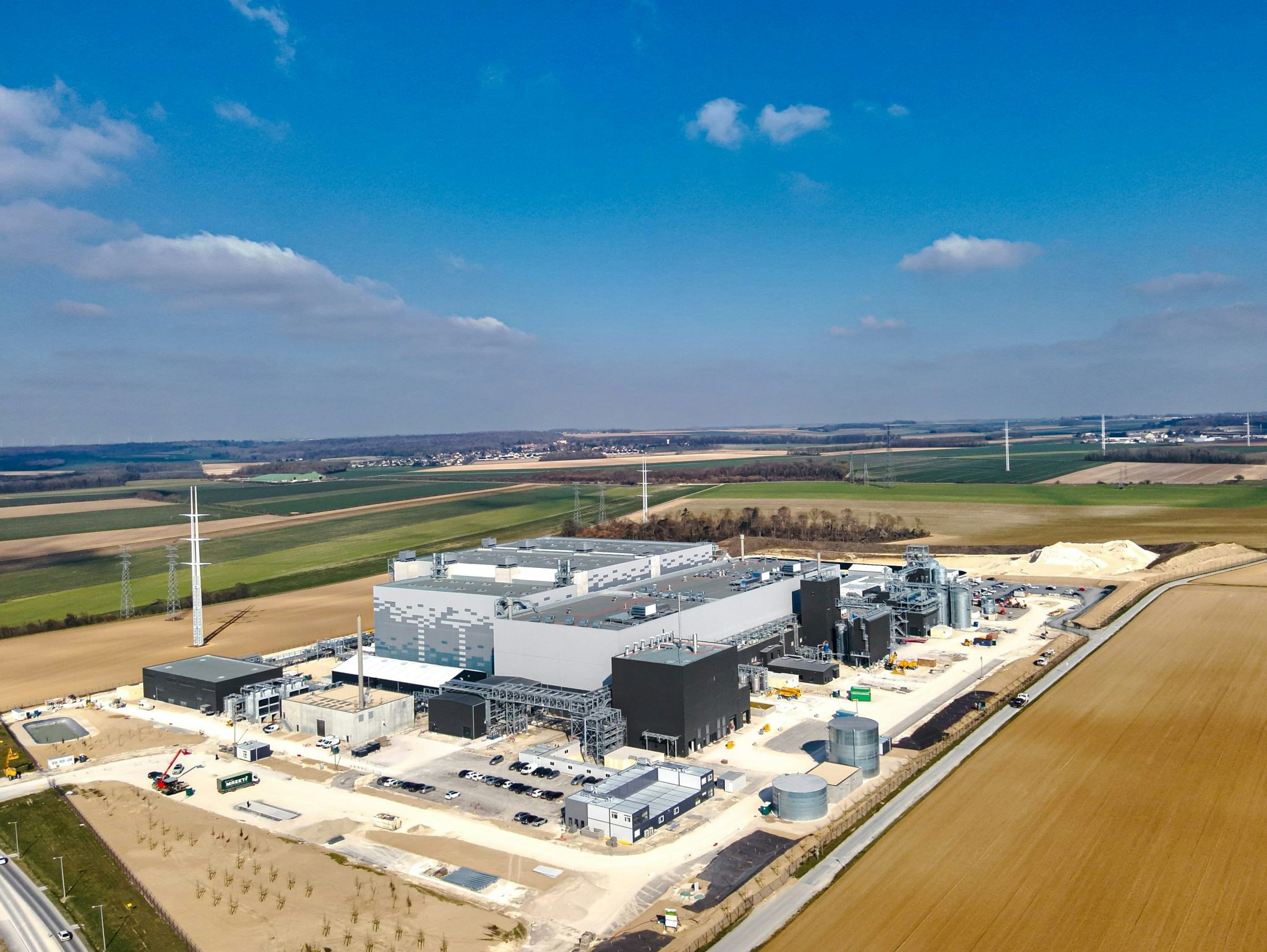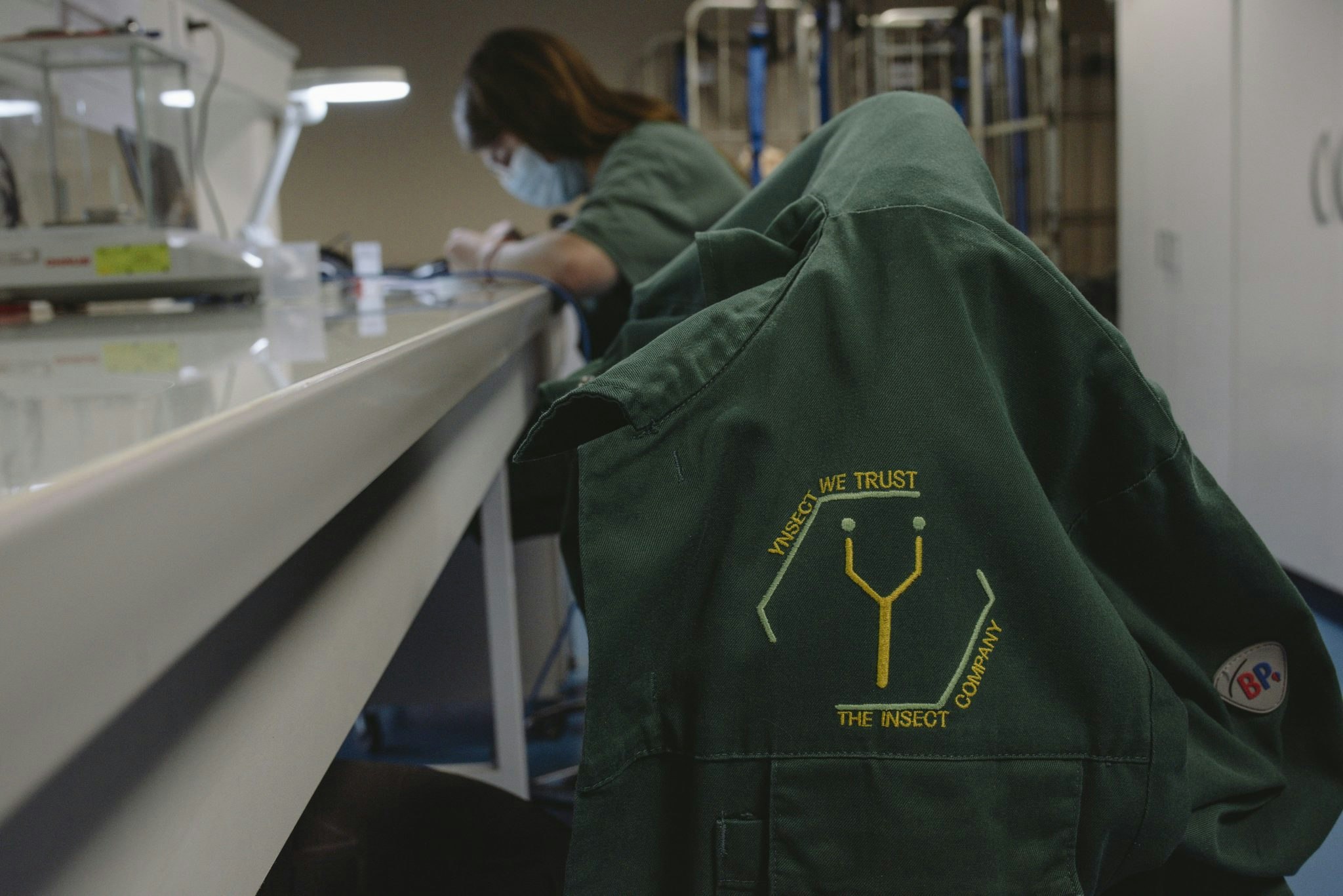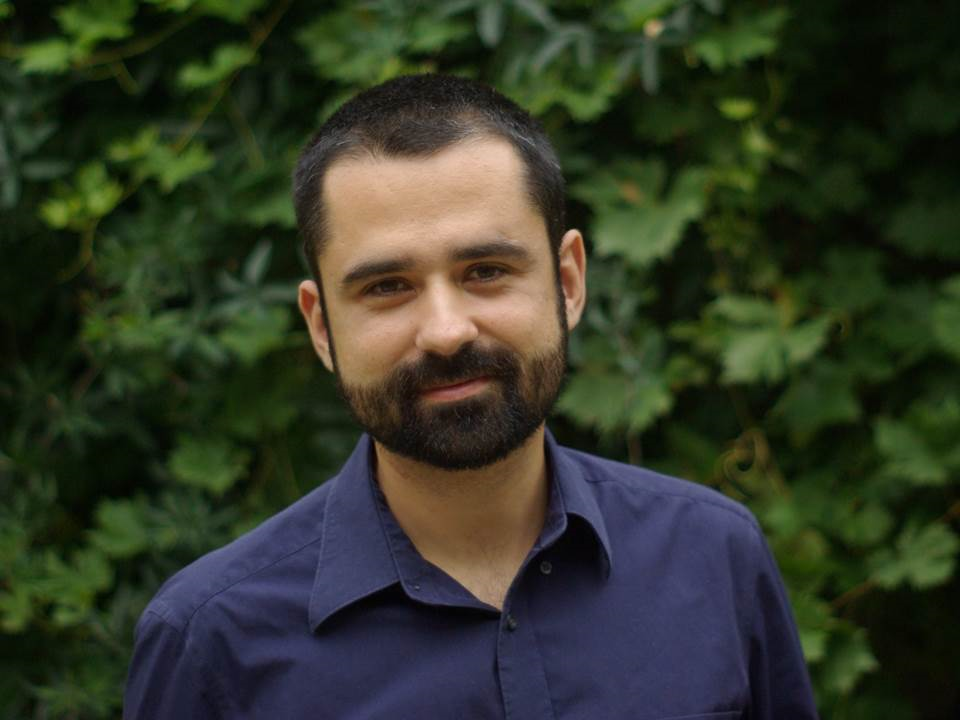About 200 kms north of Paris, at the heart of an industrial zone near the city of Amiens, a 45k sq m vertical farm stands among warehouses and car workshops — but instead of fruit and vegetables, it’s filled with live, crawling beetles.
Called Ÿnfarm, the brand-new building is the first industrial production site of French insect protein startup Ÿnsect, which farms and transforms beetles — or, in their larval form, mealworm — into ingredients that can be used to create food for animals and humans.
Entrance to the farm requires a full hazmat suit and helmet, no makeup and no jewellery, to “avoid infections,” says Ÿnsect’s cofounder Antoine Hubert. A notebook is tolerated — with the warning that it will get devoured if it were to be dropped in an insect-loaded tray.
Inside the building, large containers filled with beetles and mealworms are stacked up in metres-high racks in dark, humid, warm rooms. After several months of focusing on reproduction to ramp up the farm’s stock of insects, the past few weeks have seen the first batches of mealworm taken to the ‘kill room’, where they are transformed into protein to sell to pet food producers.
These first tonnes of produce were long-awaited. Signalling Ÿnsect’s first step into industrial-scale protein production, they marked the culmination of over a decade of R&D; four years building Ÿnfarm; and more than $600m of capital raised.
Now, says Hubert, all that’s left to do is to ramp up production to reach the farm’s full capacity, which he anticipates will be 200k tonnes of ingredients per year.
Ÿnsect is nearer than ever to that point — and there is a lot of pressure on the company to reach its objectives. Over the past decade, the startup has pioneered a brand-new industry, raising record amounts of money as it went; and now investors are keen to start seeing the vision turn into tangible results.
It’s a make-or-break moment for the company.

Farming insects
Launched in 2011, Ÿnsect was one of the first European startups to look into using insects to create alternative, more sustainable proteins for food production.
In its pilot factory in Dole in eastern France, which launched in 2015, it’s created a range of insect-based ingredients that it sells to companies that make food for humans and animals.
After bagging a $372m Series C in 2020 from investors like Astanor Ventures, public bank Bpifrance and Hollywood star Robert Downey Jr’s sustainability initiative Footprint Coalition, the company launched Ÿnfarm to scale its operations — with the objective of building a 45k sq m site, up from Dole’s 3.5k sq m.
With Ÿnfarm, the startup made the ambitious bet of fully automating the traditionally manual process of insect breeding and processing — to increase efficiencies of scale. Ÿnsect claims over 440 patents in fields ranging from robotics to computer vision through AI.
In part due to the Covid pandemic, and the energy crisis caused by the war in Ukraine, the opening of the site, planned for the end of 2021, was delayed — and last year, Ÿnsect raised a $160m Series D to finalise the development of the farm.
This made it Europe’s best-funded company in the sector — but didn’t quite match the company’s needs. “We were looking for more,” says Hubert.
In 2023, Ÿnsect also cut its headcount by 70 people, which made up 20% of the workforce. It also stopped investing in international projects, notably a partnership that had been under discussion to build an insect farm in Mexico.
Hubert says that the company managed to close an extension to the round at the start of 2024. Two sources with direct knowledge tell Sifted that the fundraise amounted to €50m, which Hubert declined to confirm.
The company plans to close the third tranche of its Series D by the end of this year, says Hubert, which it needs to cover the farm’s fixed costs and Ÿnsect’s 260 employees’ salaries while production at Ÿnfarm ramps up.
“We still have a bit of time, but we won’t hold up for two years,” he says.
Finding fresh cash has been painful. The company didn’t disclose where the Series D came from; but two sources with direct knowledge say that some historical investors refrained from returning to the fundraise. Hubert says that the round was a mix of historic and new investors.
“There are no more investors on the market,” says Hubert. “It’s felt like running in a corridor with thousands of doors on each side, and the more you run, the more they shut.”
Hitting the downturn
Ÿnsect might well be the perfect example of a company rocked by its investors’ change of tune from promoting growth at all costs — encouraging the company to launch a mega-project like Ÿnfarm — to scrutinising cash burn and profitability metrics.
With production at Ÿnfarm only just starting, the company’s revenue has been minimal so far. Hubert says that Ÿnsect currently remains under the threshold of €10m in annual revenues; while publicly-available company accounts for 2022 show that losses amounted to nearly €90m.
These numbers are enough to put off investors who in the current market are wary of capex-intensive projects.
Hubert is confident that the final financial push will enable significant revenue to come in the near-term.
“Our Series D, once it has fully closed, should enable us to reach self-sufficiency,” he says.
“We’ll reach [Ÿnfarm’s] maximum capacity in three years, and we’ll be profitable even before then — in the next two years.”
Ÿnsect’s timing has been unlucky — but four sources tell Sifted that the company also made a questionable decision in choosing to build as ambitious a factory as Ÿnfarm.
One source with direct knowledge says: “They are building a cathedral of its kind. There should have been an intermediary step.”
The decision to jump from a pilot plant to a 45k sq m mega-factory created many challenges — and not only in terms of funding requirements.
Three sources tell Sifted that there has also been a question mark around the possibility of automating the farming of insects at such scale. Mortality rates increase with the size of the operation because insects produce heat, and are more likely to die above a certain temperature.
Hubert says that managing insects’ life cycle has been one of the biggest challenges the company has faced, and that finding answers to some of the issues sometimes took several years.
A large part of the investment went towards finding cooling techniques, he says, with researchers taking inspiration from solutions ranging from data centres to conservation efforts in museums.
“A lot of people have told us that at the level of biology, it would be really complicated, but today it works,” says Hubert.
“In the last year, we’ve carried out the complete life cycle many times, and we’ve reached the yield that we wanted.”

Finding the market
Some of Ÿnsect’s competitors adopted a more modular approach to scaling. Paris-based Innovafeed built its 55k sq m site in three phases, with the final extension inaugurated last month. Dutch company Protix’s plant in the Netherlands is also a smaller scale, at 14k sq m; and French startup Agronutris’ farm is 16k sq m.
Hubert says that Ÿnsect designed a larger factory because the company, at the time of launch, was targeting customers in fish feed — an industry that requires mass volumes.
Since then, the company has changed its focus: it now plans to produce mostly for customers in pet food.
“If eight years ago, we’d known that pet food would work that well… we would have probably designed a site twice or three times smaller,” says Hubert.
“You can always re-make history. But once the farm had launched, it was too late.”
It wasn’t Ÿnsect’s first pivot. When it launched, the founders were hoping to make ingredients for human food, says Hubert — a market that turned out to be too small. The company pivoted to fish feed; but gradually abandoned the project as it emerged that it required selling huge volumes at very low prices to remain competitive.
Although contracts have been signed with fish feed producers like Skretting, the world’s biggest supplier, Hubert says that the production of ingredients for aquaculture has been paused at least for the next two years.
Instead, Ÿnsect refocused its operations on food for pet dogs and cats. In 2021, the company also acquired Dutch startup Protifarm, which focused on a different type of mealworm to make ingredients for human food — a deal that was priced at around €25m, according to one source with direct knowledge. Ÿnsect declined to confirm the number.
As part of the cost-cutting measures that came with raising the first tranche of Ÿnsect’s Series D last year, Protifarm’s production plant in the Netherlands was shut down and 35 jobs were cut. Only “a few” employees were kept, according to Ÿnsect, to support commercial and biotechnology teams in France.
Today, on top of the pet food segment, Ÿnsect also produces ingredients for specialist human foods, such as sports nutrition — although it is only a small part of the business. The company also recycles insect waste to produce fertiliser.
Leading a scaleup
Ÿnsect is facing challenges that are typical of a company building a ‘first-of-a-kind’ (FOAK) facility, says Hubert. In an industry that doesn’t yet exist and requires costly physical infrastructure, defining a clear path to scaling up is a lot harder.
“We’re literally creating an industry,” he says. “When you’re in a growth market, with growth funding, you tend to look at all the opportunities.”
But two former employees, who agreed to speak to Sifted on the condition of anonymity, say that the leadership team lacked a cohesive strategy to scale the company.
“The leadership was a problem for a large part. If you’re building such a big company, you have to control your operations, meet your targets and then scale… I don’t think that was the case,” one former employee says.
“It’s a typical example of a company raising tons of money, but no one understands what they are doing anymore.”
Another former employee said: “It wasn’t the right method, there were big governance problems.”
The company’s leadership team, which had been in place since 2021, was shuffled around last year. Ex-Engie executive Shankar Krishnamoorthy became CEO, while Hubert took up the role of executive vice president. A new board of directors was also appointed.
“Of course, you can always do better internally, we maybe got some recruitments wrong, and could’ve adjusted some processes,” says Hubert. “But we were learning as we were going.”
It’s a similar story to that of many startups.
“I always told new recruits that if they needed a structured setting and a clear vision of where we’d be in 18 months, they shouldn’t work at Ÿnsect — in fact, they shouldn’t work for a startup,” says Anaïs Maury, who was VP of corporate affairs at the company between 2020 and 2024.
“We were in a completely new sector that didn’t exist before. Things are more complex and the strategy changes.”

A first-of-a-kind
Although the industry is still in its infancy, commercial interest in the product is high.
Hubert says that Ÿnsect has secured $200m worth of contracts, mainly with pet food producers such as French company Virbac.
Its competitor Innovafeed says that it has secured over €1bn in contracts over the next 10 years; Protix recently announced a joint venture with US food giant Tyson Foods to build an insect ingredient facility across the Atlantic; and last year Agronutris signed a partnership with Danish aquaculture feed producer BioMar.
“Everyone agrees that this industry is poised for growth, with aquaculture being one of the sectors that has already embraced insects as a valuable resource,” says Julien Polenne, managing director at growth investment bank Bryan, Garnier & Co.
“Now the focus is on optimising business models, determining ideal factory sizes, and forming strategic partnerships to maximise value creation.”
For Hubert, the challenges that Ÿnsect has faced reflect the need to create a better understanding of how to enable industrial startups to emerge in Europe in innovative sectors.
Private investors are still reluctant to get behind projects that cost a lot of money and have a slower path to profitability — despite the value they can generate.
“There are 2.5k industrial startups in France today,” says Hubert. “Clearly, the reindustrialisation of France is coming through them.”
“Yet half the funding comes from [public bank] Bpifrance. We need to find ways to incentivise private players better.”
Despite the challenges, Hubert is confident that Ÿnsect is on the right track. The founder is working to close the third tranche needed to fuel the ramp up of operations at Ÿnfarm; after which the main focus will be to increase production to reach full capacity.
As soon as the company turns EBITDA-positive, he says, a whole new pocket of PE and infrastructure funds will unlock.
“These funds are telling us we’re checking all the boxes — sustainability, barrier to entry, position against competitors. But we’re missing a certain level of financial maturity,” says Hubert.
“So, what we’re missing is only a few months.”
Read the orginal article: https://sifted.eu/articles/ynsect-insect-farm-raise/


